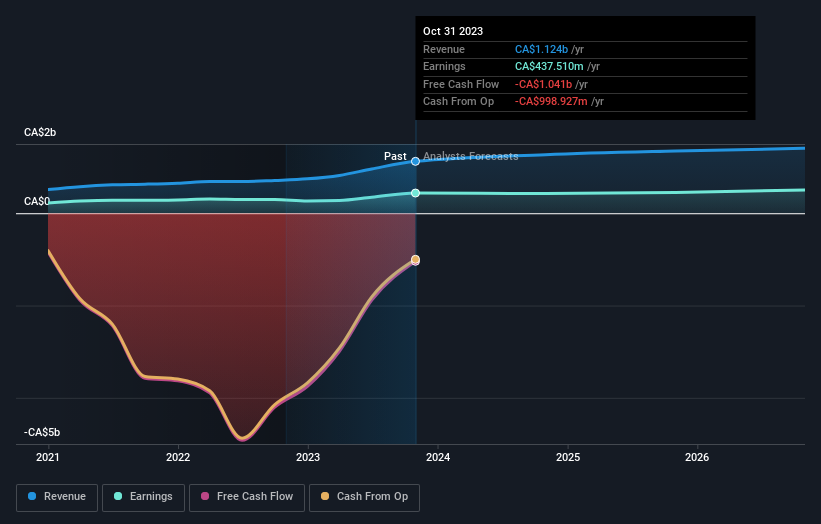Individual investors account for 50% of EQB Inc.'s (TSE:EQB) ownership, while private companies account for 27%

Key Insights
- Significant control over EQB by individual investors implies that the general public has more power to influence management and governance-related decisions
- The top 25 shareholders own 47% of the company
- Insiders have sold recently
A look at the shareholders of EQB Inc. (TSE:EQB) can tell us which group is most powerful. The group holding the most number of shares in the company, around 50% to be precise, is individual investors. Put another way, the group faces the maximum upside potential (or downside risk).
Meanwhile, private companies make up 27% of the company’s shareholders.
Let's take a closer look to see what the different types of shareholders can tell us about EQB.
View our latest analysis for EQB

What Does The Institutional Ownership Tell Us About EQB?
Institutions typically measure themselves against a benchmark when reporting to their own investors, so they often become more enthusiastic about a stock once it's included in a major index. We would expect most companies to have some institutions on the register, especially if they are growing.
We can see that EQB does have institutional investors; and they hold a good portion of the company's stock. This implies the analysts working for those institutions have looked at the stock and they like it. But just like anyone else, they could be wrong. If multiple institutions change their view on a stock at the same time, you could see the share price drop fast. It's therefore worth looking at EQB's earnings history below. Of course, the future is what really matters.

Hedge funds don't have many shares in EQB. Our data shows that Smith Financial Corporation is the largest shareholder with 17% of shares outstanding. Oakwest Corporation Limited is the second largest shareholder owning 9.7% of common stock, and Dimensional Fund Advisors LP holds about 3.2% of the company stock. Additionally, the company's CEO Andrew R. Moor directly holds 1.4% of the total shares outstanding.
Our studies suggest that the top 25 shareholders collectively control less than half of the company's shares, meaning that the company's shares are widely disseminated and there is no dominant shareholder.
Researching institutional ownership is a good way to gauge and filter a stock's expected performance. The same can be achieved by studying analyst sentiments. There are a reasonable number of analysts covering the stock, so it might be useful to find out their aggregate view on the future.
Insider Ownership Of EQB
While the precise definition of an insider can be subjective, almost everyone considers board members to be insiders. The company management answer to the board and the latter should represent the interests of shareholders. Notably, sometimes top-level managers are on the board themselves.
Insider ownership is positive when it signals leadership are thinking like the true owners of the company. However, high insider ownership can also give immense power to a small group within the company. This can be negative in some circumstances.
We can see that insiders own shares in EQB Inc.. This is a big company, so it is good to see this level of alignment. Insiders own CA$63m worth of shares (at current prices). Most would say this shows alignment of interests between shareholders and the board. Still, it might be worth checking if those insiders have been selling.
General Public Ownership
The general public, mostly comprising of individual investors, collectively holds 50% of EQB shares. This level of ownership gives investors from the wider public some power to sway key policy decisions such as board composition, executive compensation, and the dividend payout ratio.
Private Company Ownership
Our data indicates that Private Companies hold 27%, of the company's shares. Private companies may be related parties. Sometimes insiders have an interest in a public company through a holding in a private company, rather than in their own capacity as an individual. While it's hard to draw any broad stroke conclusions, it is worth noting as an area for further research.
Next Steps:
While it is well worth considering the different groups that own a company, there are other factors that are even more important. For instance, we've identified 1 warning sign for EQB that you should be aware of.
Ultimately the future is most important. You can access this free report on analyst forecasts for the company.
NB: Figures in this article are calculated using data from the last twelve months, which refer to the 12-month period ending on the last date of the month the financial statement is dated. This may not be consistent with full year annual report figures.
If you're looking to trade EQB, open an account with the lowest-cost platform trusted by professionals, Interactive Brokers.
With clients in over 200 countries and territories, and access to 160 markets, IBKR lets you trade stocks, options, futures, forex, bonds and funds from a single integrated account.
Enjoy no hidden fees, no account minimums, and FX conversion rates as low as 0.03%, far better than what most brokers offer.
Sponsored ContentValuation is complex, but we're here to simplify it.
Discover if EQB might be undervalued or overvalued with our detailed analysis, featuring fair value estimates, potential risks, dividends, insider trades, and its financial condition.
Access Free AnalysisHave feedback on this article? Concerned about the content? Get in touch with us directly. Alternatively, email editorial-team (at) simplywallst.com.
This article by Simply Wall St is general in nature. We provide commentary based on historical data and analyst forecasts only using an unbiased methodology and our articles are not intended to be financial advice. It does not constitute a recommendation to buy or sell any stock, and does not take account of your objectives, or your financial situation. We aim to bring you long-term focused analysis driven by fundamental data. Note that our analysis may not factor in the latest price-sensitive company announcements or qualitative material. Simply Wall St has no position in any stocks mentioned.
About TSX:EQB
EQB
Through its subsidiary, Equitable Bank, provides personal and commercial banking services to retail and commercial customers in Canada.
Very undervalued with adequate balance sheet and pays a dividend.
Similar Companies
Market Insights
Community Narratives



